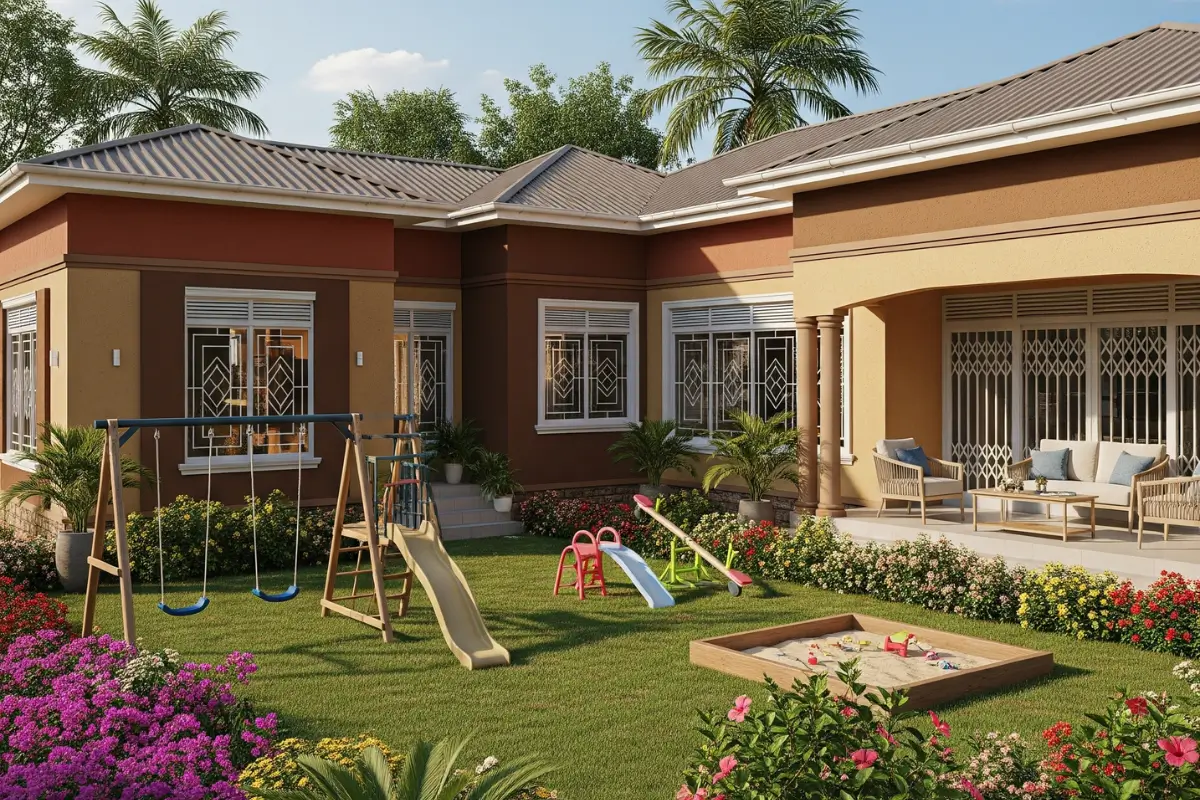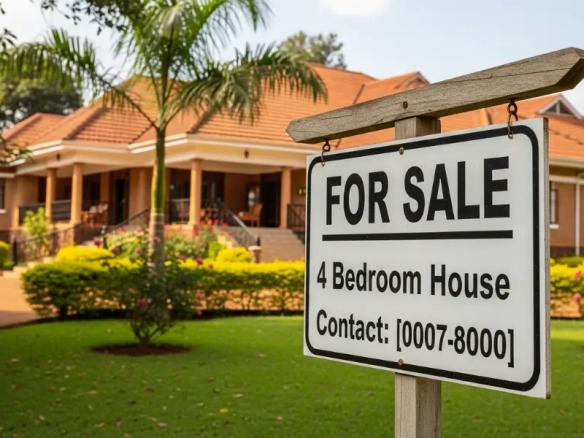Picture this: You’re sitting under the mango tree in your future backyard, watching your bazukulu (grandchildren) chase chickens while Mama prepares matooke (green bananas) in a kitchen that’s just the right size. Buying or building a house for your family in Uganda isn’t just about walls and roofs—it’s about creating a safe, joyful space where memories grow. But with so many options, how do you choose? Let’s break down the must-have features for family homes in Uganda—no fluff, just real talk from a local perspective.
1. Location: “Is It Near Schools, Hospitals, and My In-Laws?”
In Uganda, family is everything. You need a home that’s close to good schools, and convenient access to markets, hospitals, and places of worships, but also within visiting distance of relatives (because Sunday lunch at Jajja’s can be non-negotiable).
Tip: Check neighbourhoods like Kigo, Kitende, Kira, Ntinda or Kyanja—they’re buzzing with schools, clinics like Case Hospital, and markets like Nakawa. For quieter options, Entebbe, Mukono or Wakiso offer leafy suburbs.
2. Security & Safety: “Can I Sleep Peacefully?”
Safety is non-negotiable when it comes to your family’s home. No one wants to lie awake worrying about bayaaye (thugs). A family home in Uganda needs real security—not just a padlock. Look for:
- Gated communities with 24/7 guards (like Lubowa Estates or Naalya Estates).
- Perimeter walls and solar-powered security lights (because Umeme (UEDCL) outages are real).
- Surveillance cameras – are the best option for monitoring your home and scaring wrong doers aways from your home.
- Security personnel – there are a number of companies in Uganda offering security guards with weapons at affordable price
- Guard dogs – keeping one or two guard dogs will help on your security
3. Space: “Will It Fit My Extended Family?”
Ugandan families grow faster than sukuma wiki in rainy season. Prioritise:
- 4+ bedrooms (for visiting uncles and cousins).
- A compound big enough for graduation parties, kwanjula rehearsals, and a small matooke plantation.
Pro Tip: If you’re eyeing Jinja or Mbarara, land is cheaper—you can build that backyard football pitch!
4. Reliable Water & Power Supply
Nothing ruins Sunday laundry like a dry tap. Check that the property has a stable water and power supply. With challenges sometimes faced in parts of Uganda, features like water storage tanks, backup generators, or solar panels can be real game-changers. Ensure:
- Borehole access or NWSC reliability (ask neighbours!).
- Shallow well – Digging your private well can be costly, but it is more reliable and cheaper in the long run.
- Solar backup systems for lights and fridge (bye-bye, load-shedding trauma).
These features not only improve your quality of life but also enhance the resale value of the property.
5. Child-Friendly Layouts
Avoid stairs that turn toddlers into daredevils. Look for:
- Single-story homes (common in Kira or Najjera bungalows).
- Safe play areas away from busy roads.
6. Future Resale Value
Think long-term: consider the investment potential. Even if you’re buying primarily for your family’s needs, a property in a promising area can offer excellent returns in the future. Areas that are developing rapidly, such as parts of Wakiso, Mukono, Masaka, Mbarara or Mpigi often appreciate in value over time.
- Near upcoming projects like Kampala-Entebbe Expressway homes.
- Established areas like Kololo or Bugolobi hold value.
🔗 See Uganda’s Hottest Property Investment Zones.
7. Budget Flexibility
Ugandan ndugu wisdom: “Don’t chase a mansion and eat grass.”
- Mortgage-friendly homes: Banks like Housing Finance Uganda favour turnkey properties.
- Hidden costs: Factor in land title verification and agent fees.
8. Accessibility: “Will You Spend Half Your Life in Traffic?”
Let’s be real: Nothing kills the joy of a new home faster than realising your daily commute feels like a pilgrimage. In Uganda, accessibility isn’t just about distance—it’s about surviving the journey. Here’s what to prioritise:
- Public Transport Links: Is there a matatu stage or boda-boda pickup spot nearby? Areas like Naalya or Kisaasi offer easier access to taxis heading to Kampala’s CBD. But if you’re relying on the “Nakawa-Ntinda shortcut” during rush hour… good luck.
- Proximity to Major Amenities: Can you walk to a market (Nakasero or Kalerwe), hospital (Norvik), or pharmacy? For families, being near a 24/7 clinic like Paragon Hospital in Namugongo is a lifesaver when little ones fall sick at midnight.
- Road Infrastructure: Is your dream home tucked behind a murram road that turns into a swamp every rainy season? Opt for paved roads in neighbourhoods like Kyanja or Lubowa—unless you enjoy tractor rescues.
- Traffic Hotspots: Avoid areas near eternal gridlocks. Instead, look for homes with alternative routes. Pro tip: Ask boda drivers for the “panya routes”—they know back roads even Google Maps ignores!
9. Community Vibes – Good Neighbours Matter:
While not a physical feature of the house itself, the surrounding community can greatly impact your family’s happiness. A friendly and supportive neighbourhood can make all the difference. Take some time to get a feel for the area if possible.
Final Word: Think Like a Ugandan Parent
Your dream home isn’t just a house—it’s where your kids will climb mango trees, where you’ll host kwanjula gatherings, and where you’ll grow old watching the sunset over Kampala. Focus on location, layout, modern amenities, security, safety, accessibility and community. Take your time, ask real estate consultants for advice, and trust your gut.
Ekyama kwe kugula! (The secret is in buying wisely!)






Join The Discussion